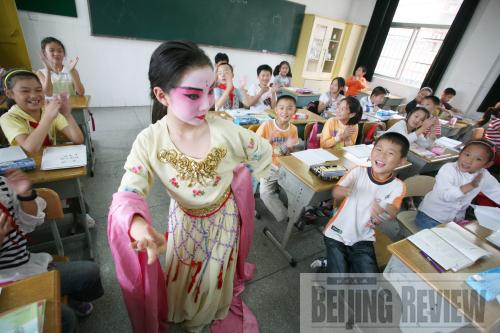|
 |
|
OPERA LESSONS: Primary school students in Taizhou in Jiangsu Province, hometown of Peking Opera master Mei Lanfang, take opera lessons (GU JUN) |
While the namesake biopic of Peking opera master Mei Lanfang captivated moviegoers by conjuring up scenes from the 1920s to the 1940s when Mei came to fame, the national opera was reaching a turning point for a larger audience.
Since then, numerous performances have been offered in Beijing, Shanghai and other cities to celebrate the Spring Festival and the upcoming 60th anniversary of the founding of the People's Republic of China. The well-received Peking Opera-version of the classic story Red Cliff, for example, was coming back to the capital for its fourth season from September 21 to 28. In cities including Tianjin and Taizhou, Mei's hometown in Jiangsu Province, Peking Opera has even become a part of the curriculum for primary and middle school students.
Will all the good news necessarily usher in a new boom for Peking Opera since its birth more than 200 years ago ? This possible prospect brings cheer to professionals and gives amateur performers and fans a reason to rejoice. Still, they have to decide the delicate balance between change and continuity and between innovation and conservation in order to save the oral and intangible heritage from dying.
With confidence in a fourth boom of Peking Opera, Tan Yuanshou, a laosheng (senior male role) player who was born in a theatrical family, said the opera may flourish if it can appeal to young audiences that have grown up with Hollywood movies and Japanese cartoons. Tan's great-grandfather, Tan Xinpei, was a famous Peking Opera master of the late Qing Dynasty and the founder of Tan-style performance.
Developing while evolving
Peking Opera has experienced several developmental booms in its more than 200 years of history. Its origin can be traced back to 1790 when the famous four Anhui opera troupes came to Beijing. Over time, techniques from many other local operas were incorporated.
Peking Opera underwent rapid development during the reign of Emperor Qianlong (1736-96) and the Empress Dowager Cixi under the imperial patron, eventually becoming more accessible to the common people.
| 